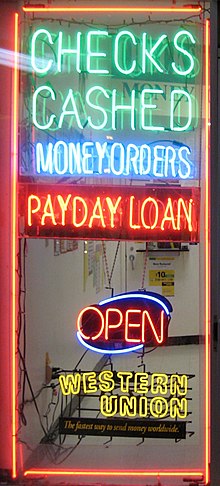Alternative financial service

An alternative financial service (AFS) is a financial service provided outside traditional banking institutions, on which many low-income individuals depend.[1][2] In developing countries, these services often take the form of microfinance.[3] In developed countries, the services may be similar to those provided by banks and include payday loans, rent-to-own agreements, pawnshops, refund anticipation loans, some subprime mortgage loans and car title loans, and non-bank check cashing, money orders, and money transfers. It also includes traditional moneylending by door-to-door collection. In New York City, these are called check-cashing stores, and they are legally exempted from the 25 percent criminal usury cap.[4]
Alternative financial services are typically provided by non-bank financial institutions, although person-to-person lending and crowd funding also play a role. These alternative financial service providers are estimated to process about 280 million transactions per year, representing roughly $78 billion in revenue. Customers include the unbanked.
Alternative financial services in the United States,[1] [2] for example via payday loans, are more extensive than in some other countries, because the major banks in the U.S. are less willing to lend to people with marginal credit ratings than their counter parties in many other countries.
In the United Kingdom, alternative financial services include payday loans and money lending, the latter termed "home collected credit", "home credit" or "doorstep loans". Organizations such as Debt on our Doorstep campaign for improved regulation.
See also
[edit]- Poverty industry
- Loan shark
- Overdraft protection loans
- Payday loan
- Refund anticipation loan
- Settlement (finance)
- Title loan
- Usury
- Mortgage discrimination
- Securitization
- Debt bondage
- Debt of developing countries
- Informal value transfer system
- Guarantor loan
References
[edit]- ^ a b Bradley, Christine; Burhouse, Susan; Gratton, Heather; Miller, Rae-Ann (2009), "Alternative Financial Services: A Primer" (PDF), FDIC Quarterly, vol. 3, no. 1, Federal Deposit Insurance Corporation, retrieved November 19, 2021
- ^ a b Blank, Rebecca M. (April 16, 2008). "Public Policies to Alter the Use of Alternative Financial Services Among Low-Income households". Federal Reserve Board Academic Consultants Meeting on Non-traditional Financial Services. Brookings Institution. p. 1.
- ^ Arp, Frithjof; Ardisa, Alvin; Ardisa, Alviani (August 2017). "Microfinance for poverty alleviation: Do transnational initiatives overlook fundamental questions of competition and intermediation?". Transnational Corporations. 24 (3). United Nations Conference on Trade and Development: 103–117. doi:10.18356/10695889-en. hdl:10419/170696. S2CID 73558727. UNCTAD/DIAE/IA/2017D4A8.
- ^ The New York Times Editorial Board (June 11, 2016). "Opinion: An Invitation to Abuse by Check-Cashing Stores". The New York Times. Archived from the original on 2016-06-13.
